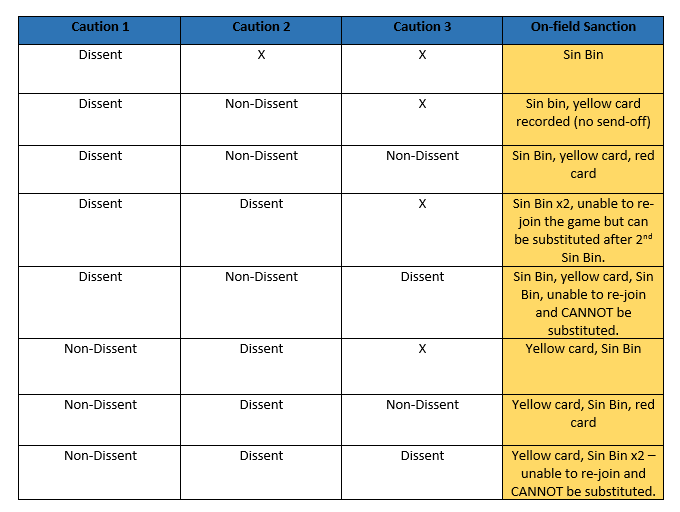Last Updated on: 11th January 2022, 02:20 pm

Created by freepik – www.freepik.com
The 2019/20 season is upon us. New football team kits have been ordered and training sessions are in full swing. Everyone is eager to start playing but there are some pretty big changes coming to the game at the grassroots level in this season. You’ll no doubt have heard that phrase and the connected Sin Bin being used a lot in the last few months. So, what exactly are they and what do they mean for you?
What is a temporary dismissal?
It’s when a player is dismissed from the pitch but they are allowed back on after a set period of time. This might be more commonly referred to as a Sin Bin. When a player has been sent off for committing an offence, they are sent to the Sin Bin.
How will it work?
For the 2019/20 season, Temporary Dismissals will be rolled out across all levels of grassroots football, including youth, veterans, and disability. They will be issued at the discretion of referees as a punishment for dissent.
What is dissent?
Dissent falls under Law 12 and refers to any challenge to the referee’s authority. It is judged by the referee but can be used to describe a player’s words or actions. For example, sarcastic clapping, commenting on a referee’s decision, and throwing the ball on the ground are all possible examples of dissent.
Note: Foul and abusive language is not covered under dissent and is still a red card offence.

Created by luis_molinero – www.freepik.com
Why dissent?
In the 2016/17 season, across all levels of grassroots football, there were 73,500 cautions for dissent. Out of all of the yellow cards issued that season a whopping 25% were for dissent.
The FA decided that something needed to be done about it. So, for the past two seasons, they started to trial a system of Temporary Dismissal. The focus was placed on dissent because, in the words of the FA’s Chief Executive, Mark Bullingham, “it is an entirely unnecessary and ugly part of football,”. Their proposed system was intended to address several problems faced by the modern game.
- Improve the matchday experience for everyone involved in the game
- Provide support for the FA’s RESPECT programme
- Help with the retention of referees
- Improve the image of the game
Sin Bins are about changing behaviour and making the game more enjoyable for everyone.
What happened during the trial?
Sin Bins were first tested amongst 31 leagues during the 2017/18 season. The pilot covered 135,000 matches and was spread out across a range of competitions.
The trial brought up a lot of encouraging statistics.
- 25 of the 31 leagues saw an overall reduction in dissent
- During the pilot, a yellow card was issued for dissent in every 2.16 matches
- Less than 1% of matched had more than 3 cautions for dissent
- There was a 38% reduction in dissent across every league that took part
So, the results looked good and the FA rolled out the test to more leagues for the 2018/19 season.
Positive Feedback
And it wasn’t just the numbers that proved the trial was successful. The feedback from people involved in the trial was also extremely positive.
- 72% of players wanted Sin Bins to remain a part of the game
- 77% of managers and coaches wanted Sin Bins to remain a part of the game
- 84% of referees wanted Sin Bins to remain a part of the game
The majority saw the benefits of Temporary Dismissals. For most people, their initial doubts about the scheme were unfounded and they discovered most players were receptive to the change. The pilot showed improvement in the matchday experience and saw players self-policing games to prevent their teammates from getting in trouble.
How will it work?
From the 2019/20 season on, every caution for dissent will be dealt with using the Temporary Dismissal process. It will only count for players on the pitch; substitutes and coaching staff are not counted under these rules.
During a game, if a player is cautioned for dissent the referee signals by issuing a yellow card in the normal way and pointing to the touchline. The player will then leave the pitch and will take up a position back with their management.

Created by freepik – www.freepik.com
How long is a player in the Sin Bin?
- For 90 minute matches, the period of dismissal will be 10 minutes. For shorter matches, the period is reduced to 8 minutes.
- The period starts once play has restarted. This means any player hoping to reduce their time by leaving the pitch slowly will be out of luck.
- The whole period must be adhered to. If the player is still in the Sin Bin at the end of the first half or when a match goes into extra time, the remaining time is carried over.
- The player can only return to the pitch when they have received a signal from the referee. All final decisions rest with them and nobody else.
Key Points
- Play doesn’t need to stop for a player to return but the referee must give them a signal.
- A player in the Sin cannot be substituted until their period of dismissal is over.
- Any player who received two cautions for dissent in the same game will get a one-match ban.
- If a player is in the Sin Bin at the end of extra time, they are allowed to take part in a penalty shoot-out.
- There will not be an admin fee for a dissent offence.
- If a substitute commits an act of dissent from the touchline they will be issued with a caution and reported as a normal C2 caution for dissent.
- A player can warm up in the Sin Bin but they cannot interfere with play.

Icons made by Freepik from www.flaticon.com
What are the benefits of Sin Bins?
The point of Temporary Dismissals is to give a player time to calm down and reflect on their behaviour. It is hoped that being removed from the pitch will allow a player to see how their behaviour affects their whole team. During the trial, most players came back with a positive attitude and were apologetic for their attitude.
Sin Bins will also encourage teammates to help each other out during matches. Players will want to help each other avoid time in the Sin Bin to make sure they can play with a full team.
The improvements to behaviour and attitude will only help the image of the game. It will increase the enjoyment for everyone on and off the field. Rather than simply wanting to punish players, the scheme is hoping to improve the game as a whole.
Repeat Offenders
We know what happens when a player is cautioned for dissent, but what happens if they get multiple cautions?
- What if a player commits 2 dissent offences in one game?
That player is sent to the Sin Bin again and, after the period of dismissal is over, that player will not be able to re-enter the game. However, they can be substituted provided the team has not used all their subs.
- What if a player gets a non-dissent caution after having already been in the Sin Bin?
The player is issued with a yellow card and the player will be able to continue playing.
- What if a player commits a red card offence having already been in the Sin Bin?
The player is shown a red card and dismissed from the field of play. They will be unable to take any part in the rest of the game and cannot be substituted.
- What if a player gets a 2nd dissent caution and already has a non-dissent caution?
The player will be sent to the Sin Bin but, when the period of dismissal is over, they will not be able to re-enter the field of play. The player cannot be substituted.

What do you think?
The evidence from the trial period suggests that the introduction of Sin Bins could show great improvements for grassroots football but there are still some people who don’t like the changes. So, what are your thoughts? Are you looking forward to the new scheme or do you think it has changed the game of football? Let us know in the comments or catch us on social media.
More Information
If you would like more information about the introduction of Sin Bins then the FA has created an interactive guide to help anyone involved in grassroots football.
